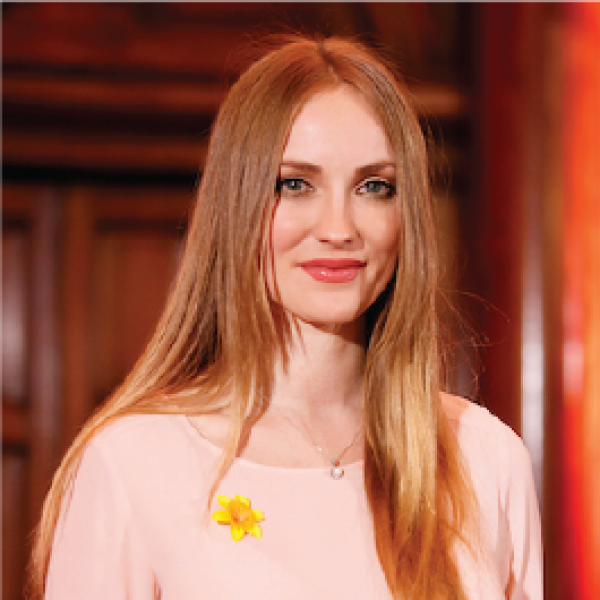Researcher in Focus: Alexandra Tuzova

Alexandra Tuzova is an Irish Cancer Society funded PhD scholar researching prostate cancer. We would like to congratulate her on the recent submission of her PhD thesis.
Alex kickstarted her research career with an undergraduate degree in Genetics at Trinity College Dublin (TCD), which she was awarded in 2012. She then began a two-year research assistant position at Associate Professor Antoinette Perry’s Prostate Molecular Oncology Group (Institute of Molecular Medicine, TCD). She completed her MSc by research through the Irish Research Council-Enterprise Partnership Scheme, focusing on urinary miRNA profiling for early detection of aggressive prostate cancer.
In 2015, Alex joined the University College Dublin (UCD) Cancer Biology and Therapeutics lab and was awarded an Irish Cancer Society PhD scholarship to decipher the epigenetic regulation of enhancers in aggressive prostate cancer, under the mentorship of Associate Professor Perry and Professor Liam Gallagher.
A highlight of her PhD was the opportunity to spend three months at the laboratory of eminent clinician and epigeneticist Professor John Greally, at Albert Einstein College of Medicine in New York, where she was immersed in the field of computational epigenomics. This invaluable research experience, which was fully funded by the Irish Cancer Society mobility fund, allowed Alex to develop from a purely lab-based scientist into a competent bioinformatician. Since returning from New York, Alex has diligently applied herself to the formidable task of analysing multiple large scale epigenomic datasets to unearth aggressive prostate cancer biomarkers.
Given that prostate cancer is the most common non-skin cancer in Irish men of which a proportion is highly aggressive, there is an urgent need to better understand what causes aggressive prostate cancer. In her PhD, Alex examined the DNA of patients with prostate cancer, on a hunt for important DNA sequences called “enhancers”. Enhancers are crucial because they determine which genes in DNA are switched on in the tumour cell. Alex determined which specific enhancers are significantly changed in the aggressive form of this disease. She discovered that these enhancers are abnormally targeting developmental and cancer associated cellular processes that are likely contributing to the aggressive behaviour. Alex has also identified a panel of enhancers that can act as a signature for early detection of aggressive prostate cancer to reduce unnecessary and invasive treatments, which can impact quality of life of Irish men.
Throughout her PhD, Alex was awarded several scholarships to attend national and international meetings where she continued developing her computational skills and presented posters of her own work, including at the Wellcome Trust Chromatin Structure and Function Course in the UK, Cancer Genetics and Epigenetics Gordon Research Conference in Italy, and Epigenomics at Van Andel Research Institute in Michigan.
Most importantly, Alex believes in maintaining patients on the centre stage of her research efforts and found it greatly rewarding to engage with cancer survivors at the inaugural Conway Festival Engagement Badge abstract workshop, which taught her how to describe her research in a clear and understandable way.
Alex has recently submitted her PhD thesis and is preparing for her viva voce in June 2021.
She has published her first research article in the Journal of Clinical Oncology - Precision Oncology, which describes early detection of aggressive prostate cancer using urine as a non-invasive liquid biopsy. This work was highlighted in national and international media in 2019.
Alex is in the midst of completing two more first author manuscripts, which detail her work investigating the role of microRNAs and enhancer DNA methylation in aggressive prostate cancer, respectively. Submission of these articles to peer-reviewed journals is anticipated in mid 2021.
In the future, Alex hopes to collaborate with her international network to further upskill and introduce novel research strategies and techniques to the Irish cancer research community.
For more information
Phone
1800 200 700
